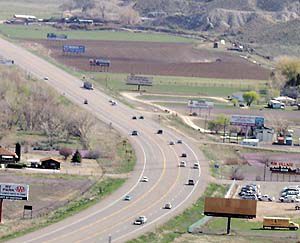| Drivers will hit the road in larger numbers as weather warms up. In addition, the end of another school year adds a new set of drivers to the road. Recently enacted laws will go into effect as early as May 1. Many of the changed laws will impact all drivers, while a handful target new drivers. |
More than 360 new laws are set to go into effect beginning in May and AAA Utah wants to make sure drivers are aware of changes in the law that may affect them.
“We don’t want anyone to be caught off-guard,” said Rolayne Fairclough, spokeperson for the automobile association. “The first time you find out about a new law should not be when you are getting a ticket for breaking it.”
Here are highlights of new transportation laws that become effective May 1 unless otherwise noted:
•Teen Driving – A new law strengthens the nighttime driving and passenger restriction of Utah’s Graduated Driver Licensing laws. Under these new provisions, there will no longer be exemptions to the nighttime driving and passenger restrictions for school or church activities.
The one exemption that will be honored is if students return to school from a school sponsored activity in a school bus after midnight. In this case, the students can drive themselves home from school.
Another law allows teens to obtain their learner permit at 15 years of age at the driver license division after they have passed the knowledge test, and the physical and mental fitness test. After they receive their learner permit, they may operate a vehicle if they have a person over 21 years of age occupying the passenger seat. To obtain a driver license, a young driver must be 16 years old; complete a driver education program; have their learners permit for at least six months; have 40 hours of driving experience with an adult driver, with 10 of those hours at night; and pass the skills test required by the Utah Driver License Division. This law takes effect August 1.
•Street Racing – Those drivers who engage in speed contests or exhibition of speed will find there will be harsher penalties for these activities. Under the new law their vehicles may be impounded and they will have to pay an administrative fee to free their vehicle from impoundment. In addition, they will be charged with a class B misdemeanor; their driver license will be suspended for up to 60 days for the first offense and 90 days for a second offense; and the court is required to forward a report of a speed contest or exhibition of speed conviction to the driver license division.
•DUI Enhancements – The new law changes the penalty for causing a serious injury while operating a vehicle and also having marijuana or derivative equivalent substances in the body from the current class A misdemeanor to a third degree felony.
A second degree felony can now be imposed if the operator of a vehicle causes a serious injury while having a schedule I or schedule II substance other than marijuana in their body.
Another law strengthens the interlock law related to those convicted of driving under the influence. This new law prohibits an interlock restricted driver from operating or being in actual physical control of a vehicle without an interlock system.
The law also requires a peace officer to warn a person that has been placed under arrest for refusing to submit to a chemical test for alcohol or drugs that a refusal may result in a three-year prohibition of driving without an ignition interlock device. The peace officer must also impound a vehicle if the driver is cited for an ignition interlock system violation.

